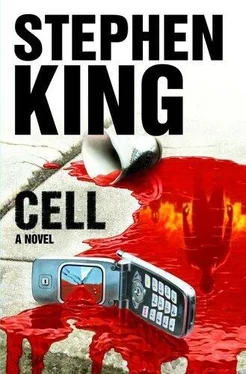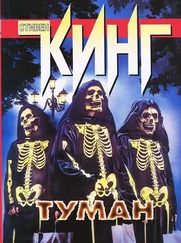I think it's the smell of telepathy. And if it is, we're not ready for it. It's too strong for us. It burns the brain, somehow, the way too much current will burn out the electrical system in a car or a —
"Help me with her!" Jordan yelled from behind him. "Help me with her, she's fainting!"
He turned and saw that Denise had gone down on all fours. Jordan was on all fours beside her and had one of her arms over his neck, but she was too heavy for him. Tom and Dan couldn't get forward enough to help. The corridor cutting through the mass of phoners was too narrow. Denise raised her head, and for a moment her eyes met Clay's. The look was one of dazed incomprehension, the eyes those of a slugged steer. She vomited a thin gruel onto the grass and her head dropped down again. Her hair fell around her face like a curtain.
"Help me!" Jordan shouted again. He began to cry.
Clay went back and started elbowing phoners in order to get on Denise's other side. "Get out of the way!" he shouted. "Get out of the way, she's pregnant, can't you fools see she's preg—"
It was the blouse he recognized first. The high-necked, white silk blouse that he had always called Sharon's doctor shirt. In some ways he thought it was the sexiest garment she owned, partly because of that high, prim neck. He liked her bare, but he liked to touch and squeeze her breasts through that high-necked, white silk blouse even more. He liked to bring her nipples up until he could see them poking the cloth.
Now Sharon's doctor shirt was streaked black with dirt in some places and maroon with dried blood in others. It was torn under the arm. She doesn’t look as bad as some, Johnny had written, but she didn't look good; she certainly wasn't the Sharon Riddell who had gone off to school in her doctor shirt and her dark red skirt while her estranged husband was in Boston, about to make a deal that would put an end to their financial worries and make her realize that all her carping about his "expensive hobby" had been so much fear and bad faith (that, anyway, had been his semi-resentful dream). Her dark blond hair hung in lank strings. Her face had been cut in a number of places, and one of her ears looked torn half-off; where it had been, a clotted hole bored into the side of her head. Something she had eaten, something dark, clung in curds to the corners of the mouth he had kissed almost every day for almost fifteen years. She stared at him, through him, with that idiotic half-grin they sometimes wore.
"Clay help me!" Jordan almost sobbed.
Clay snapped back. Sharon wasn't here, that was the thing to remember. Sharon hadn't been here for almost two weeks now. Not since trying to make a call on Johnny's little red cell phone on the day of the Pulse.
"Give me some room, you bitch," he said, and pushed aside the woman who'd been his wife. Before she could rebound, he slid into her place.
"This woman's pregnant, so give me some fucking room." Then he bent, slipped Denise's other arm over his neck, and got her up.
"Go on ahead," Tom said to Jordan. "Let me in, I've got her."
Jordan held up Denise's arm long enough for Tom to slip it over his own neck. He and Clay carried her that way the final ninety yards to the doors of Kashwakamak Hall, where the Raggedy Man stood waiting. By then Denise was muttering that they could let her go, she could walk, she was all right, but Tom wouldn't. Neither would Clay. If he let her go, he might look back for Sharon. He didn't want to do that.
The Raggedy Man grinned at Clay, and this time that grin seemed to have more focus. It really was as though the two of them shared a joke. Sharon? he wondered. Is Sharon the joke?
It seemed not, because the Raggedy Man made a gesture that would have seemed very familiar to Clay in the old world but seemed eerily out of place here: right hand to the right side of his face, right thumb to ear, pinkie finger to mouth. The phone-mime.
"No-fo-you-you," Denise said, and then, in her own voice: "Don't do that, I hate it when you do that!"
The Raggedy Man paid her no mind. He went on holding his right hand in the phone-gesture, thumb to ear and pinkie to mouth, staring at Clay. For one moment Clay was sure he also glanced down at the pocket where the cell phone was stowed. Then Denise said it again, that horrible parody of his old routine with Johnny-Gee: "No-fo-you-you." The Raggedy Man mimed laughing, and his ruined mouth made it gruesome. From behind him, Clay felt the eyes of the flock like a physical weight.
Then the double doors of Kashwakamak Hall opened on their own, and the mingled odors that came out, although faint—olfactory ghosts of other years—was still an anodyne to the stink of the flock: spices, jams, hay, and livestock. It wasn't completely dark, either; the battery-powered emergency lights were dim, but hadn't yet given out entirely. Clay thought that was pretty amazing, unless they had been saved especially for their arrival, and he doubted that. The Raggedy Man wasn't telling. He only smiled and gestured with his hands for them to go in.
"It'll be a pleasure, you freak," Tom said. "Denise, are you sure you can walk on your own?"
"Yes. I've just got one tiny bit of business first." She drew in breath, then spit in the Raggedy Man's face. "There. Take that back to Hah-vud with you, fuckface."
The Raggedy Man said nothing. He only grinned at Clay. Just two fellows sharing a secret joke.
6
No one brought them any food, but there were snack machines galore and Dan found a crowbar in the maintenance closet at the huge building's south end. The others were standing around and watching him pry open the candy machine— Of course we're insane, Clay thought, we eat Baby Ruths for dinner and tomorrow we'll have Pay Days for breakfast —when the music started. And it wasn't "You Light Up My Life" or "Baby Elephant Walk" coming out of the big speakers ringing the grassy mall outside, not this time. It was something slow and stately that Clay had heard before, although not for years. It filled him with sadness and made gooseflesh run up the soft insides of his arms.
"Oh my God," Dan said softly. "I think it's Albinoni."
"No," Tom said. "That's Pachelbel. It's the Canon in D Major."
"Of course it is," Dan said, sounding embarrassed.
"It's as if . . ." Denise began, then stopped. She looked down at her shoes.
"What?" Clay asked. "Go on, say it. You're among friends."
"It's like the sound of memories," she said. "As if it's all they have."
"Yes," Dan said. "I suppose—"
"You guys!" Jordan called. He was looking out one of the small windows. They were quite high, but by standing on his tiptoes, he could just manage. "Come look at this!"
They lined up and looked out at the wide mall. It was almost full dark. The speakers and the light-standards loomed, black sentinels against the dead sky. Beyond was the gantry shape of the Parachute Drop with its one lonely blinking light. And ahead, directly ahead, thousands of phoners had gone to their knees like Muslims about to pray while Johann Pachelbel filled the air with what could have been a substitute for memory. And when they lay down they lay as one, producing a great soft swoop of noise and a fluttering displacement of air that sent empty bags and flattened soda cups twirling into the air.
"Bedtime for the whole brain-damaged army," Clay said. "If we're going to do something, it's got to be tonight."
"Do? What are we going to do?" Tom asked. "The two doors I tried are both locked. I'm sure that's true of the others, as well."
Dan held up the crowbar.
"Don't think so," Clay said. "That thing may work just fine on the vending machines, but remember, this place used to be a casino." He pointed to the north end of the hall, which was lushly carpeted and filled with rows of one-armed bandits, their chrome muted in the glow of the failing emergency lights. "I think you'll find the doors are crowbar-resistant."
Читать дальше








